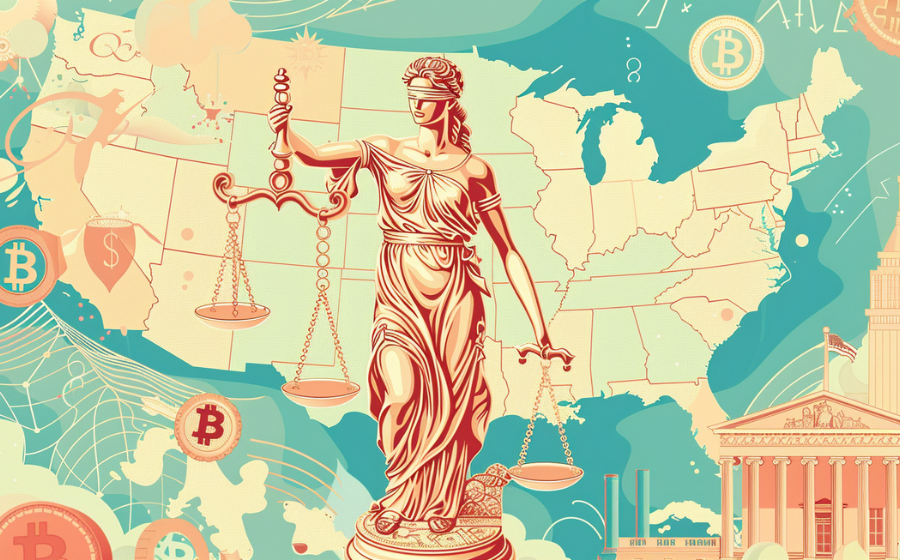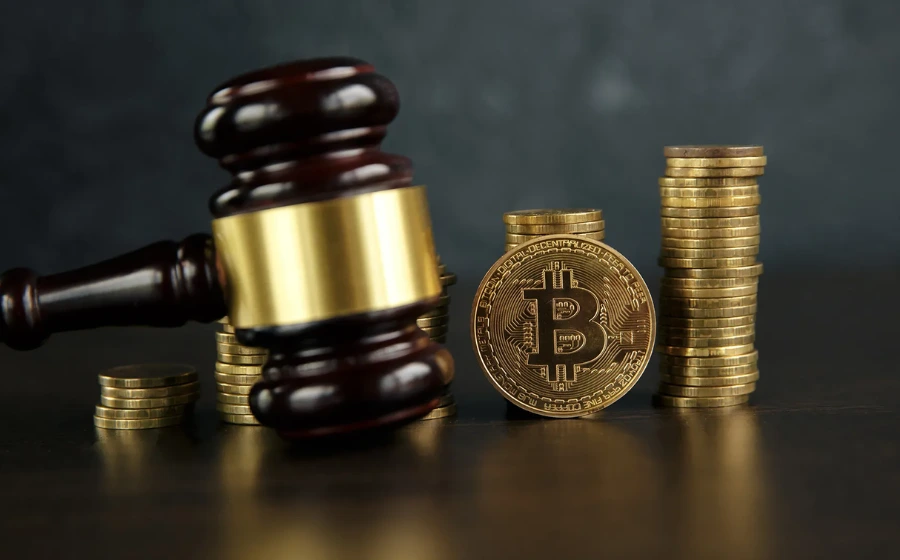
KEYTAKEAWAYS
- U.S. crypto regulation remains fragmented, with multiple agencies involved. The lack of a unified framework creates compliance challenges for businesses in the crypto industry.
- Regulatory focus intensifies on exchange oversight, custodial asset protection, and anti-money laundering measures to enhance market integrity and investor safety.
- Stablecoin regulation is gaining momentum, with proposed legislation aiming to establish clear frameworks and distinguish stablecoins from securities.

CONTENT
Explore the evolving landscape of U.S. crypto regulation in 2024. Uncover key trends in exchange oversight, asset protection, AML compliance, and stablecoin legislation shaping the industry’s future with CoinRank!
WARNING FROM THE FBI AND RESISTANCE FROM THE CRYPTO COMMUNITY
Recently, the FBI issued an announcement reminding American citizens not to use crypto asset transfer service providers that are not registered as Money Services Businesses (MSB). The FBI announced that it would conduct enforcement actions against unlicensed cryptocurrency services that do not comply with federal laws. Users who utilize unlicensed cryptocurrency fund transfer services might be affected during these enforcement actions, leading to interruptions in their ability to access funds, particularly if their cryptocurrencies are mixed with funds obtained through illegal means.
The FBI advises users to verify whether a service is registered as an MSB with the Financial Crimes Enforcement Network (FinCEN) before using remittance services. This can be done through the following website: https://www.fincen.gov/msb-state-selector. However, this move has sparked opposition from some in the crypto community who argue that the definition of an MSB is unclear and that many decentralized crypto asset services, which are not listed on the website, will be impacted.
Despite the opposition, it is expected that U.S. law enforcement agencies will increasingly focus on the development of the crypto asset industry. This is especially true in the wake of the collapse of the FTX exchange, past fraud incidents involving crypto assets, and the association of cryptocurrencies with money laundering and terrorist financing activities. These factors will likely lead to greater scrutiny from regulatory authorities.
>> Also read: Global Crypto Regulation Guide H1 2024: EU, Japan, Singapore, UAE, and Hong Kong Updates
CURRENT REGULATORY ATTITUDE OF THE UNITED STATES
Despite ongoing efforts by the federal and state governments in the U.S. to regulate and clarify the development of crypto assets, most regulations still rely on expanding interpretations of existing laws or specific state regulations. Currently, there is no unified legal framework in the U.S. for regulating the crypto asset industry. This lack of uniformity has led to legal uncertainties and complexities in compliance for U.S. crypto asset businesses.
At the federal level, the main regulatory authorities involved in the crypto asset industry include:
- Securities and Exchange Commission (SEC)
- Commodity Futures Trading Commission (CFTC)
- Federal Trade Commission (FTC)
- Department of the Treasury
- Internal Revenue Service (IRS)
- Office of the Comptroller of the Currency (OCC)
- Financial Crimes Enforcement Network (FinCEN)
On the state level, there are specific regulations like New York State’s BitLicense, issued by the New York State Department of Financial Services (NYSDFS), which permits businesses to store, hold, maintain, or control crypto assets on behalf of others, engage in the buying and selling of crypto assets for customers, or execute conversions, control, management, or issuance of crypto assets. Additionally, Wyoming has introduced the DAO Supplement, becoming the first state to regulate DAOs and recognize them as Limited Liability Companies (LLCs). Wyoming has also enacted the Wyoming Stable Token Act, creating a pathway for issuing stablecoins in the U.S., requiring these stablecoins to be fully backed by dollar reserves.
Thus, the current state of crypto asset regulation in the U.S. is fragmented. While there are proposals for comprehensive federal regulations, such as the Responsible Financial Innovation Act and the recent Lummis-Gillibrand Payment Stablecoin Act introduced in April by Senators Cynthia Lummis and Kirsten Gillibrand, as of 2024, most federal frameworks are still in the proposal and congressional discussion stages, without a clear regulatory structure. Most regulations still rely on existing laws like the Securities Exchange Act and judicial rulings to provide a regulatory framework. Meanwhile, state governments individually regulate crypto assets through local laws.
U.S. REGULATORY FOCUS AND TRENDS IN 2024
-
Regulation of Cryptocurrency Exchanges:
Due to the current lack of a comprehensive and consistent federal licensing and registration process in the U.S., participants in the crypto ecosystem must obtain licenses under the existing regulatory framework. For example, the compliance-focused centralized exchange Coinbase provides a platform for trading crypto assets with other cryptocurrencies or fiat currencies. Coinbase’s business model can be broken down into three main areas:
- Crypto Asset Trading:
This involves buying and selling crypto assets. In the U.S., the Financial Crimes Enforcement Network (FinCEN) regulates the transfer, exchange, and trading of crypto assets from an anti-money laundering (AML) perspective under the Bank Secrecy Act (BSA). According to FinCEN’s 2019 “Application of FinCEN’s Regulations to Certain Business Models Involving Convertible Virtual Currencies” and the 2013 “Application of FinCEN’s Regulations to Persons Administering, Exchanging, or Using Virtual Currencies,” service providers that meet the definition of a Money Transmitter (such as exchanges and issuers) must register as Money Service Businesses (MSB) within 180 days of establishment. This requires compliance with BSA and FinCEN regulations, including AML and counter-terrorist financing (CFT) obligations. Additionally, state-level regulations, such as the New York State Department of Financial Services (NYDFS) BitLicense, allow license holders to offer Bitcoin trading, receiving, and storage services, with requirements including consumer protection, AML compliance, and cybersecurity guidelines.
- Custody of User Assets (Crypto or Fiat):
For example, Coinbase’s subsidiary, Coinbase Custody Trust Company, LLC, is a New York State-chartered limited-purpose trust company. It obtains state-level trust licenses and is regulated, inspected, and supervised by the NYDFS. This includes requirements for crypto asset custody, capital adequacy, BSA and AML programs, related transaction restrictions, and reporting obligations.
- Listing of Crypto Assets:
This involves the definition of securities in the U.S. If a listed crypto asset is deemed a security by the SEC, the exchange must register as a national securities exchange or an Alternative Trading System (ATS), which encompasses various securities trading platforms. Intermediaries helping buyers and sellers must also register as broker-dealers. In the U.S., a precedent-based legal system, the SEC uses the Howey Test to determine whether an asset is a security. This test involves a complex and case-specific analysis that evolves over time, making outcomes difficult to predict. This has led to criticism from the crypto community that the SEC’s determinations are highly subjective and challenging to comply with due to the varying compliance requirements for securities.
-
Custodial Protection of User Assets:
Following the collapse of FTX and the approval of Bitcoin ETFs, the U.S. Securities and Exchange Commission (SEC) has emphasized the need to strengthen crypto asset custody rules. The SEC aims to increase market transparency and protect investor funds by requiring investment advisors to place client crypto assets with “qualified custodians” to reduce risks within exchanges. In February, the SEC proposed amendments to the Custody Rule to enhance the protection of client assets managed by SEC-registered investment advisors (RIAs).
-
Anti-Money Laundering (AML):
As the FBI’s recent statement mentioned, the U.S. government will conduct a comprehensive risk assessment of crypto assets and establish AML plans based on the assessment results. This will require entities involved in Money Services Businesses (MSBs) to apply for relevant licenses and ensure that license holders strictly comply with the Bank Secrecy Act (BSA) and the Anti-Money Laundering Act of 2020. These regulations include submitting Suspicious Activity Reports (SARs) and implementing customer due diligence measures.
-
Regulation of Stablecoins:
As the stablecoin market grows, U.S. legislators have proposed more regulatory bills aimed at clearly distinguishing stablecoins from securities in the uncertain legal environment of U.S. securities definitions. The Responsible Financial Innovation Act seeks to provide clear regulation for digital asset market participants and establish a regulatory framework for stablecoins that promotes financial innovation, integrates digital assets into existing tax and banking laws, and stimulates innovation in the digital asset field.
In 2023, the Clarity for Payment Stablecoins Act of 2023, also known as “H.R. 4766,” was introduced to establish a dedicated regulatory framework for stablecoins. This act defines payment stablecoins and stipulates issuance methods, including through insured depository institutions and money transmission businesses. It also requires stablecoin issuers to comply with standardized requirements to ensure operational uniformity and safety, develop standards for interoperability and compatibility between payment stablecoin systems, and include provisions for customer asset and privacy protection.
In 2024, U.S. Senators Cynthia Lummis and Kirsten Gillibrand, who previously introduced the Responsible Financial Innovation Act, reintroduced a bill related to stablecoins, the Lummis-Gillibrand Payment Stablecoin Act. This act requires stablecoin issuers to establish dedicated subsidiaries for issuing stablecoins, adhere to strict capital and reserve requirements, and ensure that all stablecoins are fully backed by cash or cash equivalents. It also prohibits the issuance of algorithmic stablecoins without asset backing. The act stipulates that issued stablecoins should enable near-instantaneous global payments and support new applications to provide individuals with greater financial control and flexibility, particularly in reducing costs for international remittances. Furthermore, the act aims to deter entities that do not comply with U.S. financial crime regulations from issuing dollar-denominated stablecoins by implementing strict penalties, thereby combating the use of stablecoins for illicit financing.
These regulatory efforts indicate a clear trend towards more stringent oversight and comprehensive regulatory frameworks in the U.S. crypto-asset industry, emphasizing investor protection, market integrity, and compliance with AML/CFT obligations.
>> Also read: 3 Major Implications and Legal Issues Following SEC Approval of Bitcoin ETFs in the U.S.
CONCLUSION
Using the FBI’s recent advisory against using unlicensed crypto service providers as a starting point, this article aims to explore the U.S. government’s regulatory strategies and attitudes towards the crypto asset industry in 2024. Currently, despite ongoing regulations and explanations from federal and state governments, there is still no unified and comprehensive legal framework in the U.S. This, coupled with the involvement of multiple regulatory bodies, results in legal uncertainties and compliance complexities for market participants. Particularly, the SEC’s interpretation and determination of what constitutes a “security” add to the complexities for businesses aiming to comply with U.S. regulations, making it more challenging compared to other countries.
However, recent news, actions by relevant authorities, and legislative discussions provide insights into the regulatory focus and trends for 2024. Key trends include:
- AML and CFT Compliance: There is a strong emphasis on ensuring that businesses comply with anti-money laundering (AML) and counter-terrorist financing (CFT) regulations.
- Custodial Protection of User Assets: The SEC is proposing strengthened crypto custody rules to increase market transparency and safeguard investor funds.
- Stablecoin Regulation: Discussions around stablecoins are gaining momentum, particularly since major stablecoins like USDT and USDC are denominated in U.S. dollars. This ties into the U.S.’s monetary policy and global financial market influence, making dollar-denominated stablecoins a significant focus for U.S. legislators. Future developments may include clearer distinctions between stablecoins and securities or a more comprehensive regulatory framework for stablecoins.
In summary, the U.S. is taking an increasingly stringent approach to regulating the crypto asset industry. The focus is expected to intensify on key issues such as the regulation of exchanges, custodial protection of user assets, anti-money laundering measures, and stablecoin oversight. This evolving regulatory landscape aims to enhance market integrity, investor protection, and compliance within the rapidly growing crypto sector.
▶ Buy Crypto at BingX
Sign up to claim 5,000+ USDT in rewards & 20% off trading fees!
Looking for the latest scoop and cool insights from CoinRank? Hit up our Twitter and stay in the loop with all our fresh stories!

















